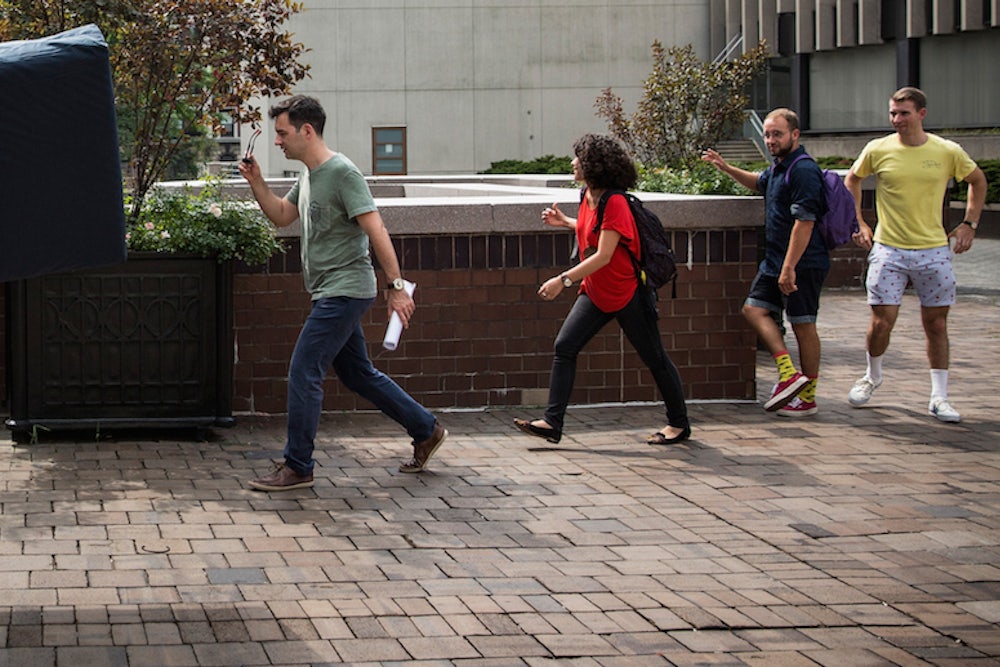This was the year, to quote the title of Ann Friedman's recent piece for New York magazine, that “Everyone (Finally) Started Talking About Sexual Assault.” 2014 opened with Dylan Farrow’s letter describing her sexual abuse allegations against Woody Allen, and closed with debates on the allegations against Bill Cosby and the unraveling of Rolling Stone's story about an alleged gang-rape of a University of Virginia student named Jackie. In between—the many accusations against former NFL star Darren Sharper, Columbia student Emma Sulkowicz's mattress art-protest, even allegations of sexual abuse against Lena Dunham—there was a lot to talk about.
If 2014 was the year sexual assault became part of the national conversation, thanks largely to survivors who came forward, it was also the year that those survivors' stories were intensely scrutinized online—Jackie and Farrow, notably, but lately Sulkowicz, too. Friedman laments this onslaught, writing that we're making progress "but at the expense of individual survivors."
In fact, it means we’re finally taking sexual assault seriously—and investigative rigor can only help the movement as a whole.
There are compelling reasons we should assume that survivors are telling the truth. For one, false accusations are extremely rare. For another, as Zerlina Maxwell writes at The Washington Post, the "cost of disbelieving women … is far steeper" than the cost to the accused. Survivors have been through so much physical and psychological trauma already, why put them through more?
Because justice can never be achieved by assuming factuality. Investigating survivors’ stories requires an uncomfortable line of questioning, but it's the best way to approach the truth. As this year showed, we can't even trust progressive universities or respected reporters to get it right.
Our pursuit of justice should not be so fevered as to presume guilt or trample the accused's rights. “The victims deserve justice," Judith Shulevitz wrote for The New Republic in October. "The men deserve due process.” She argued that “the rules governing sexual conduct on campus have strayed from any commonsense understanding of justice.” Indeed, national stories this year didn’t just describe victims who were denied justice, they also introduced alleged assailants who were mistreated once they'd been accused and punished for crimes they may not have committed. The Boston Globe ran a story in August about a former University of Massachusetts Amherst student suing the school for his expulsion following a sexual assault allegation against him, despite the fact that, according to the lawsuit, his accuser did not call their interaction harassment, assault, or rape when she filed her complaint.
And then there's Jackie, who endured more scrutiny than any accuser this year. Her brutal account of being gang-raped at a UVA fraternity party, as described to Rolling Stone's Sabrina Rubin Erdely, prompted widespread horror and disbelief. This disbelief, it turned out, was well founded. In a series of stories for The Washington Post, T. Reiss Shapiro essentially re-reported the story, investigating Jackie’s claims, interviewing her classmates, and generally doing deeper research than Erdely had done. (Rolling Stone explained that it had "decided to honor" Jackie's request that her alleged assaulters not be contacted, "for fear of retaliation against her.") The story unraveled. The fraternity in question didn’t have a party the night Jackie claims to have been assaulted; the particular individual Jackie claims orchestrated the assault may or may not exist; even the description of the assault itself seems to have changed significantly.
The unraveling of Jackie’s story is bad for Jackie, it’s bad for Erdely, it’s bad for Rolling Stone, and at first glance it seems bad for the credibility of sexual assault survivors everywhere. But we’ve come further than that, as the rest of 2014 shows. The unraveling of Jackie’s story hasn’t cast widespread doubt on stories of rape in our country. As women continue to come forward with allegations against Bill Cosby, the media—not only established media outlets, but also social media—have sympathized more often with these women than not. But even negative media attention can be a good thing for a survivor’s story.
For example, in July, Slate’s Amanda Marcotte wrote about a teenager named Jada, who discovered she had been sexually assaulted only after pictures of her passed out and naked at a party began to circulate online. The images went viral, as did the hashtag #jadapose, which was used to tag images imitating her. Then Jada's supporters hijacked the hashtag to lend emotional support and to push back against the bullies. “Man, does this demonstrate what a double-edged sword social media can be when it comes to issues of assault and bullying,” wrote Marcotte, explaining how Jada then decided to go public with her identity. Because she was already in the public eye, Jada now had a platform from which to speak out against sexual assault.
In a follow up story on Jada this month, Marcotte wrote that while we don’t know if media pressure lead to the arrests of Jada’s assailants, “what we do know, from Jada herself, is that the media attention helped her cope personally with the harassment, and keep fighting for justice.” Public scrutiny isn’t pleasant, and due diligence can gut a story. But if we’re going to talk about sexual assault, it can’t only be in monologues and platitudes. We also have to ask tough questions, and this year, it seems we’ve finally started to.
